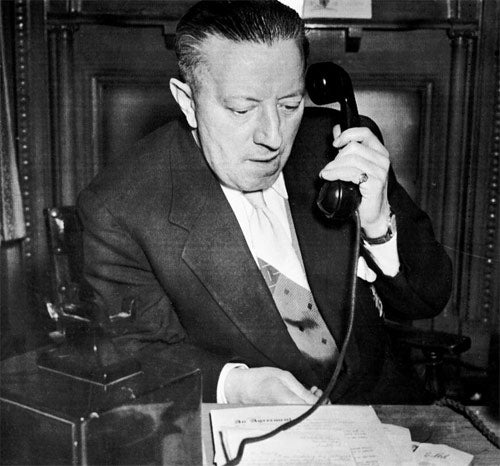Jimmy Murphy: 'He was a brilliant teacher but didn't want to command'
Jimmy Murphy battled his nature to lead stricken Manchester United after Munich

When Jimmy Murphy's son unveiled a memorial to his father in the Old Trafford museum's Munich room a few years back, he told how the unassuming Welshman would have insisted on being left at the pub down the road, had he lived to see the day. Not the most memorable line ever, but it brought the house down because that is how people remember the man who became de facto manager as Sir Matt Busby fought for life after the events of 6 February 1958. Murphy was, as Sir Bobby Charlton put it, "a brilliant teacher of players, but he didn't want to command".
Perhaps that explains, as United prepare to mark the 50th anniversary, the sense among some around Old Trafford that Murphy has not been remembered as he might for his part in managing United through the days of impoverished struggle and, as Charlton remembers it, "panic" when the club attempted to rebuild after Munich. "If you talk to a lot of Manchester City fans they'll talk about 'Mercer and Allison' but [at United] they talk about the Matt Busby years," says Murphy's son, also Jimmy.
Murphy, Busby's assistant, had missed United's fateful trip to Red Star Belgrade to guide his nation successfully through a World Cup play-off match against Israel in Cardiff, and the role he assumed in its aftermath ran against the grain of an individual who would train a team through wind and rain but could not tell a man he hadn't made the grade. If the sheer devastation of the aftermath was not enough for Murphy to contend with – "he missed some funerals because you can't go to eight all at once," recalls his son, who remembers the death of Bert Whalley, United's chief coach and Murphy's great friend, hitting him hardest – then there was also the parlous state of United's finances at the time.
The club was destitute compared with rivals City, who in the aftermath of the disaster quietly took on roles that United with their full-time staff of just 11 simply could not handle. As City's director Sidney Rose, a surgeon, discreetly arranged medical help for returning players, United appointed Ken Ramsden, now club secretary at United, on £2.15 a week to provide administrative back up.
Ramsden, hired because he lived in the same Salford street as Les Olive, who stepped up to the club secretary's job after Walter Crickmer died at Munich, recalls how United used the Old Trafford gymnasium to lay out of the coffins of players and asked his own mother and aunt, laundry room staff at the club, to polish them. "We bought nothing new," he says. "Everything was second-hand. We were skint."
In this scene of devastation, Jimmy Murphy's great powers of judgement and humanity were to serve him well. Busby would be able to sign Denis Law from Torino for a club record £115,000 in 1962, but Murphy had to decide which youth team players to cast into the fray as United struggled to fulfil fixtures and which to buy when the league gave them special dispensation to bring some in. Ernie Taylor, Blackpool and England inside forward and Stan Crowther, a tough tackler from Aston Villa, were shrewd buys.
Murphy also convinced Billy Foulkes, who survived Munich, he could make the step up to club captain after Roger Byrne's death. "Billy said: 'I can't do it and I won't do it'," Murphy's son recalls. "My father said: 'You can and you will'. That's what my dad was like. He had this knack of picking people and he was usually proved right."
Within three months Murphy had taken United to the FA Cup final at Wembley, an achievement perhaps as great in the circumstances as the win over Benfica there a decade later.
Murphy was assistant manager until 1971 and died in 1989. His family never really knew how the tragedy affected him. "I never saw that side of him, because I didn't see much of him at all," his son says. But Charlton, in his biography written by The Independent's James Lawton, tells a different story of what Murphy went through. "One day he was discovered in a back corridor of the hospital," he said, "sobbing his heart out in pain at the loss of so many young players he adored for their talent and who he loved like sons."
Join our commenting forum
Join thought-provoking conversations, follow other Independent readers and see their replies
Comments